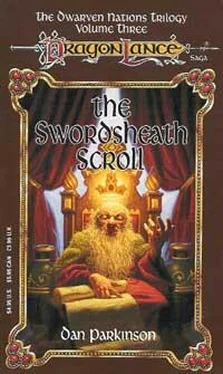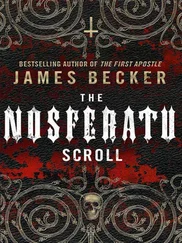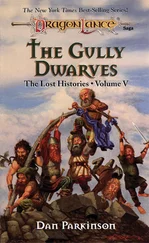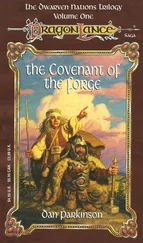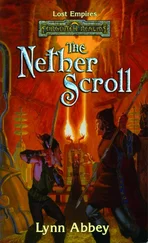Dan Parkinson - The Swordsheath Scroll
Здесь есть возможность читать онлайн «Dan Parkinson - The Swordsheath Scroll» весь текст электронной книги совершенно бесплатно (целиком полную версию без сокращений). В некоторых случаях можно слушать аудио, скачать через торрент в формате fb2 и присутствует краткое содержание. Жанр: Фэнтези, на английском языке. Описание произведения, (предисловие) а так же отзывы посетителей доступны на портале библиотеки ЛибКат.
- Название:The Swordsheath Scroll
- Автор:
- Жанр:
- Год:неизвестен
- ISBN:нет данных
- Рейтинг книги:3 / 5. Голосов: 1
-
Избранное:Добавить в избранное
- Отзывы:
-
Ваша оценка:
- 60
- 1
- 2
- 3
- 4
- 5
The Swordsheath Scroll: краткое содержание, описание и аннотация
Предлагаем к чтению аннотацию, описание, краткое содержание или предисловие (зависит от того, что написал сам автор книги «The Swordsheath Scroll»). Если вы не нашли необходимую информацию о книге — напишите в комментариях, мы постараемся отыскать её.
The Swordsheath Scroll — читать онлайн бесплатно полную книгу (весь текст) целиком
Ниже представлен текст книги, разбитый по страницам. Система сохранения места последней прочитанной страницы, позволяет с удобством читать онлайн бесплатно книгу «The Swordsheath Scroll», без необходимости каждый раз заново искать на чём Вы остановились. Поставьте закладку, и сможете в любой момент перейти на страницу, на которой закончили чтение.
Интервал:
Закладка:
If Derkin was aware of their watchful eyes upon him, across the great, crowded cell, he gave no evidence of it. The chisel in his hand made almost no sound as he began the tedious cutting of rivets, driving the cutting edge of the tool methodically against the softer metal of the binds, using his free fist as a hammer.
It would take time, but he was in no hurry. In his two previous escape attempts, he had learned much of the pattern of the shafts and the terrain beyond the mines. And he had listened to the talk in the shafts. In a few weeks, they said, the next grand tour of inspection would begin.
Through the rest period he worked, pausing only to swill down a wooden bowl of slops when the old, one-armed pail tender came by. When the horns sounded, he buried his chisel in a chink in the stone floor, rubbed soot on the spots of bright metal where he had worn down the rivets, and lined up with others on his shift to file out of the cell for another day's grueling labor under the eyes of armed human guards. Each step of the way, as always, his loop of heavy chain dragged and clinked behind him. The chain was nearly eight feet long, with heavy iron links an inch and a half in diameter. It weighed almost forty pounds. Most of the slaves in the mines-certainly all of those young enough or strong enough to ever pose a threat to the human taskmasters-wore ankle cuffs and chains. But most of the bonds were smaller and lighter than Derkin's. The big, heavy chain dragging behind him was his "reward" for his second attempt to escape.
Most slaves in the mines dreamed of escape. Some, particularly among the stubborn, surly dwarves, had even tried to escape at one time or another. But rarely, if ever, did anyone try it more than once. The punishment was more severe and painful each time. Derkin's second lashing had been with a special flail, its thongs tipped with balls of lead. Such a beating would have broken the ribs of a human or an elf. It was after that beating that he had been fitted with the heavy chain.
At the end of the day's labors, after another bowl of slops, he retrieved his chisel and went back to work. Today, and tomorrow, and for as many tomorrows as it took, he would prepare for his departure from bondage.
He knew the way now, and he knew the time. He had seen the fortifications at the north end of Tharkas Pass. The time to make an escape, and possibly succeed, would be when the human delegation from Daltigoth arrived, when the masters and guards of the mine complex were preoccupied with welcoming their visiting dignitaries.
Part I
Klanath
Century of Rain
Decade of Cherry
Summer, Year of Copper
1
The mines of Klanath, under tbe direction of three successive emperors of western Ergoth, had become a huge, sprawling complex of pits, shafts, and digs extending for miles along the vertiginous slopes of the peaks that rose like a wall of ranked monoliths above the deep forests to the north and west. Named for the first true emperor of the human realm of Ergoth, Klanath the Conqueror, the mines — and the entire region they commanded-had become a sizable outpost of the empire's center in far-off Daltigoth. Even before the recent discovery of rich new lodes of metallic ore in the wild mountains south of Tharkas Pass, the Klanath mines had supplied more than half of Ergoth's treasured iron, nickel, and coke, as well as copper and tin in smaller quantities. But since the discovery of the Tharkas lodes, the complex of mines had nearly doubled in size.
Sakar Kane himself had led the human forces that thronged through the pass to attack and defeat the dwar-ven miners at their village of Tharkas. He had claimed all of the lands south of the pass for the empire. Now the dwarves who had survived, along with thousands of others captured by slavers raiding through the mountain lands, were Lord Kane's slaves. They worked in the shafts and tunnels, the caverns and sumps, the pits and the slag heaps, the slopes and the scours.
Among the slaves were other races as well-humans, goblins, mightily bound ogres, and even a few elves. But the most numerous of the slaves, and the most prized by their masters, were dwarves. Stubborn and unrelentingly hostile, often as ready to fight among themselves as against others, the thousands of dwarves imprisoned here were a constant nuisance to the overseers. But when it came to working in mines, every dwarf was worth five of any other race. Adept at tunneling, climbing, delving, and the shaping or breaking of stone, the dwarves were natural miners.
The mountains south of Tharkas Pass were full of dwarves. Legend held that there had once been a mighty nation of dwarves there, protected by the huge, subterranean fortress called Thorbardin. But Thorbardin no longer exercised power over the mountain lands. Village after village, mine after mine, and valley after valley, the raiders had swept down in massive attacks until most of the dwarves north of the wilderness ranges were now dead or enslaved, or had simply vanished into the wilderness.
With the growth of the mines of Klanath, so had grown the population of humans there. What had been a scattering of overseers' villages and headquarters shacks had become a fair-sized city, sprawling across the flats at the north end of Tharkas Pass, and it was here that much of the empire's wealth was assembled.
Thus it was not unusual for various high personages from the emperor's court to accompany the annual visits of inspection by the Grand Master of Mines. Many of the great court had visited Klanath in the past, though usually only once. Rich they might be, but the sprawling warrens of Klanath were unsightly and reeking, lacking any of the civilities and trappings of Daltigoth, the opulent city they served.
In recent years, though, there had been changes. The changes had come with the repeated visits of Sakar Kane, the tall, brooding man who was better known as Lord Kane. Three times in as many years, Kane-a cousin of the emperor, some said-had passed through Klanath on his way to and from the conquered mining regions south of Tharkas Pass.
Since his second visit, hordes of craftsmen and slaves had worked to construct a new fortification in the midst of the spreading encampments. Now the compound of Lord Kane, dominating the north approach to Tharkas Pass, was the most formidable structure in the region. The rumors had circulated through Klanath-and even among the slaves-that Lord Kane's next visit would be permanent. It was said that he had been given command of the region-even to include authority over the Grand Master of Mines-and that Klanath would be his base.
It was whispered that the emperor intended to extend his realm eastward, maybe even as far as the elven lands of the Silvanesti. It was said that Lord Kane's authority was part of a grander plan, and that Lord Kane's fortress would serve as more than just headquarters for the empire's mines.
It was suspected that Klanath would be a stronghold for the assaults to the east, a link in a chain of conquest that would take in all of southern Ansalon.
Shalit Mileen had heard all of the rumors and had savored them. As chief of pits, Shalit Mileen was one of a dozen deputies of old Renus Sabad, the Master of Mines. One of a dozen, but in his own mind not like the others who were his peers. Most of them seemed perfectly content with their lot, each having a bit of authority in one area of Klanath, and each ready to clean the boots of old Renus, to sing his praises or fetch his tankard, to secure their positions in his favor.
Most of the operation of the mines rested with these deputies. Just as Shalit Mileen ran the soft-ore pits, giving commands and keeping records, driving his overseers to drive their slaves to increase production each year, so did each of the other deputies run an operation. Yet each season, when the high-borns came from Daltigoth, arriving in splendid entourage to inspect the emperor's resources, it was not the deputies who received them and had the honor of reporting the latest successes. No, when the inspectors came, the deputy mine masters were sent deep into their respective works. It was the Master of Mines, old Renus, who each year met with the dignitaries and humbly took full credit for all of the fine works that had been done.
Читать дальшеИнтервал:
Закладка:
Похожие книги на «The Swordsheath Scroll»
Представляем Вашему вниманию похожие книги на «The Swordsheath Scroll» списком для выбора. Мы отобрали схожую по названию и смыслу литературу в надежде предоставить читателям больше вариантов отыскать новые, интересные, ещё непрочитанные произведения.
Обсуждение, отзывы о книге «The Swordsheath Scroll» и просто собственные мнения читателей. Оставьте ваши комментарии, напишите, что Вы думаете о произведении, его смысле или главных героях. Укажите что конкретно понравилось, а что нет, и почему Вы так считаете.
